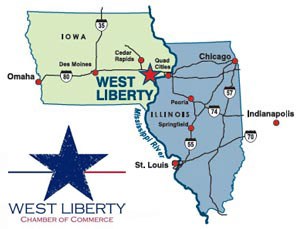One of the side effects of insatiable telecom industry consolidation is that hard-working, honest, and consumer-friendly providers are swept up by corporate machinery that ends up providing Americans with the least amount of service for the highest possible price. Remarkably, there are still some top-shelf independent providers out there that actually stand with their customers, fighting to bring better broadband service to everyone in their service areas.
A letter to the editor in the West Liberty Index caught my eye. It chastised the Federal Communications Commission for its plans to treat rural Americans as second class broadband citizens with speed goals 25 times slower than those enjoyed by their urban cousins. The FCC, the writer wrote, was simply not going far enough for consumers. What was so remarkable about the letter? It was signed by an Internet Service Provider — Jerry Melick, manager of Liberty Communications.
What would happen if the federal government decided that city roads, bridges and infrastructure should be better-constructed and more efficient than the roads in rural America? What about if the policy-makers determined that urban consumers should be able to get where they are going and get what they need faster than rural consumers? A new government plan intends to make that true of our nation’s information superhighway — the Internet. And, while it is not the highway coming into town, as rural consumers, we should still be very concerned.
[…]
The FCC’s plan will make rural Americans second class citizens in the new broadband world, because it establishes a speed goal for rural areas that is 25 times slower than for urban areas. Shouldn’t rural residents have access to the same broadband services as our larger towns and cities? Despite the construction of our state of the art Fusion network, we still face the challenge of how to bring broadband to our rural customers living outside of the communities of West Branch and West Liberty. Without a National Broadband Plan that supports further investment in rural areas, this will be difficult if not impossible to accomplish.
 Melick supports broadband reform efforts at the FCC and changing the Universal Service Fund to provide assistance to companies like his, serving rural eastern Iowa, to build out its fiber to the home Fusion network to nearly every resident in its service area. That’s a refreshing change of pace from the usual rhetoric from AT&T, Frontier, Verizon, and others.
Melick supports broadband reform efforts at the FCC and changing the Universal Service Fund to provide assistance to companies like his, serving rural eastern Iowa, to build out its fiber to the home Fusion network to nearly every resident in its service area. That’s a refreshing change of pace from the usual rhetoric from AT&T, Frontier, Verizon, and others.
Liberty Communications began service as the independent West Liberty Telephone Company in 1899. It delivered telephone service for more than 100 years until January 2008, when the company announced it was going to construct its own fiber to the home network to provide television, telephone, and broadband service to its customers. The Fusion network would expand later that year to start construction in nearby West Branch, the birthplace of Herbert Hoover, the nation’s 31st president. By April 2009 the fiber network offered a true triple play package of services to customers in both cities. Fusion broadband customers can buy up to 20/2 Mbps service from Liberty. For the rest of its service area, Liberty still relies on DSL service providing up to 3 Mbps, but believes fiber is the future for all of its customers.
The only question remaining is when forward-thinking policies at the FCC will be enacted to help that goal?


 Subscribe
Subscribe

Heh – if your plan A is dependent on forward-thinking policies from the FCC, you might want to consider a plan B. Liberty is just another corporation looking for a government handout. That’s how we got to where we are, and we certainly don’t need more of that.